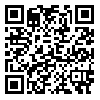BibTeX | RIS | EndNote | Medlars | ProCite | Reference Manager | RefWorks
Send citation to:
URL: http://irj.uswr.ac.ir/article-1-211-fa.html
Objectives: Some studies have recognized factors that are effective on academic achievement. The aim of the present study was to determine the relationship among personality factors, motivational strategies and achievement goals in predicting academic achievement of 2nd grade high school intellectually disabled students in Tehran Province.
Methods: In present correlation study, 200 intellectually disabled students (126 females and 74 males) in 2nd grade high school selected randomly by stratified sampling method from Tehran Province. Subjects completed Big Five Factor Personality Inventory (NEO-FFI), Motivational Strategies for Learning Questionnaire (MSLQ) and Achievement Goals Questionnaire-Revised (AGQ-R). Data analysis was based on stepwise regression analysis method.
Results: As personality factors, openness and being conscientiousness were correlated positively. In motivational strategies, effort regulation, help seeking and self-efficacy correlated positively, also mastery-approach and performance-avoidance goals in achievement goals orientation showed positive correlation (P<0.05). Neuroticism, test-anxiety and academic achievement were correlated negatively (P<0.01). It can be explained that 44% of variations in academic achievement are due to self-efficacy, Being conscientiousness, mastery-approach goal and neuroticism (P<0.05). Self-efficacy had the most contribution in predicting academic achievement of students (P<0.01).
Discussion: Paying attention to the variables such as: personality (being conscientiousness and neuroticism), motivational (self-efficacy) and achievement goals orientation (mastery-approach goal) have crucial role in predicting academic achievement in students with intellectual disability.
دریافت: 1390/6/29 | پذیرش: 1390/8/16 | انتشار: 1390/9/10



